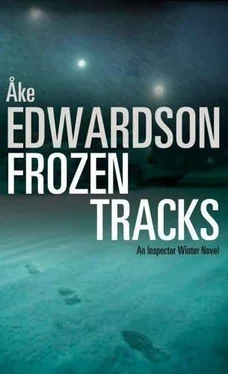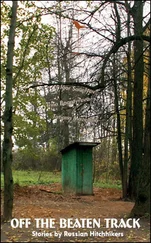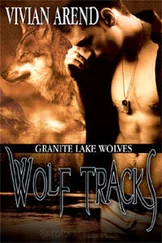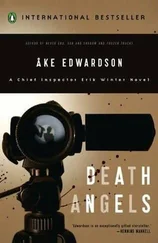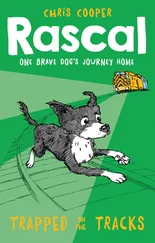“A criminal returns to the scene of the crime,” said Ringmar. “Or retraces his tracks.”
“What were his tracks?” wondered Winter.
“Where he’d been before with the children,” said Djanali.
“But then the question is:
Why there?” said Winter. “If we assume that the places weren’t chosen at random, that there was a reason why he picked those particular ones.”
“Maybe he lives nearby?” said Djanali.
“Near what?” said Ringmar. “The locations of those playgrounds and day nurseries cover an area several kilometers in diameter.”
“Near one or more of them,” said Djanali.
“We’ve already followed up that possibility,” said Ringmar. “We’re checking up on all the various housing estates.”
“But he might not live there at all,” said Winter. “The point could be that he lives for away from all the places.”
“Which are quite close to one another nevertheless,” said Djanali, glancing at Ringmar. “Central. Apart from Marconigatan.”
“Which is only ten minutes by streetcar from Linnéplatsen,” said Ringmar.
Winter took another drag at his cigarillo. He could feel the chill from the open window.
“Say that again, Bertil.”
“Er, what?”
“What you just said.”
“Er, well… Marconigatan, which is only a ten-minute streetcar ride away from Linnéplatsen. But the same from lots of other places as well, I assume.”
“The streetcar,” Winter said.
“Wasn’t the idea that we should forget the streetcar link for a moment or two?” asked Djanali.
“Where were we, then?” said Winter.
“A criminal returns to the scene of the crime,” said Ringmar.
“I want to drive around with Simon again,” said Winter. “It’s necessary. It might work better this time.”
“Does he remember what route they took?”
“I don’t know,” said Winter. “Probably not. But we know where he was picked up, and we know where he was dropped off. Obviously, we know the area in between-but there are lots of possible routes. Then again, there can’t be that many different ways of getting from A to B.”
“Assuming that he took the direct route from A to B,” said Djanali.
“I didn’t say he did,” said Winter,
“He could have circled around again and again,” said Djanali. “Tunnels, roundabouts.”
“He didn’t have unlimited time,” said Ringmar.
“We know approximately when Simon went missing,” said Winter, “and approximately when he was found.”
“Which isn’t the same as when he was dropped off there,” said Djanali.
“The radio program,” said Ringmar.
“I’ll try to take him for a spin tomorrow morning,” said Winter.
“Were they on the way to the kidnapper’s home?” wondered Djanali, mainly to herself. “But something got in the way?”
“The question is: Who got in the way?” said Ringmar.
“Good,” said Winter.
“Was it something Simon said or did?”
Winter nodded.
“Something that disappointed our kidnapper?”
Winter nodded again.
“Or was that the intention from the start?” said Djanali. “Part of a plan. A plan that didn’t work out?”
“What sort of a plan?” asked Winter, looking at Djanali.
“The same plan that did work the next time,” she said. “Micke Johansson.”
“He got scared when he was with Simon,” said Ringmar. “He didn’t dare… Didn’t dare to go through with it.”
Go through with what? thought Aneta Djanali, and she knew that the others were asking themselves the same question.
“But the way of going about it is very different,” she said instead. “It might not be the same person at all.”
“It isn’t different,” said Winter. “Or doesn’t need to be. He might have followed Carolin and Micke from the nursery school. He might have been standing outside there day after day, waiting for an opportunity. There and at the other places as well.”
“And filming,” said Ringmar.
“Or he might have been roaming around Nordstan,” said Djanali. “It’s no accident that everything happened there, OK? Not just a coincidence. Just as likely that he stood day after day outside a playground or a nursery school is the possibility that he wandered around Nordstan. For instance. Maybe the same days, the morning here, the afternoon there.”
“Good, Aneta,” said Winter.
“He might live out in the countryside,” said Ringmar, looking at Winter. “As far away as possible from Nordstan, which is the image mentally deficient people have of a big city.”
“The countryside’s a big place,” said Winter.
“How many people do we have on the case?” said Djanali.
“Not nearly enough,” said Ringmar. “The Christmas holiday presents problems with overtime, not to mention law and order and neighborhood policing.”
“But for Christ’s sake, this is more important than Christmas dinner!” said Djanali. “A boy is missing, kidnapped, but no kidnapper has announced himself. We could be looking at a matter of hours.”
Kidnapping, Winter thought. A kid napping. A little snooze. Fast asleep when Santa Claus arrived with his presents. If only.
RINGMAR RECEIVED A TELEPHONE CALL THAT HE WANTED TO take in his own office. Winter could see how nervous he was when he left, and the shadows under his eyes. What was he going to hear now? What would he say?
“I’ll pay a visit to Ellen Sköld again,” said Aneta Djanali. “I know what I’m going to say, and how to say it.”
Winter looked at the clock. The traditional Donald Duck cartoon on TV would be over. The long night had fallen outside the window. It was too late to drive through the streets with Simon Waggoner to follow streetcar lines.
“Ellen has probably already told us what we need to know,” said Winter.
“I want to be certain.”
“Go home to your family,” said Winter. “Celebrate Christmas.”
“That will be at Fredrik’s,” she said.
Winter nodded and started gathering together some papers.
“Are you surprised?” asked Djanali.
“Why should I be surprised?”
“Well… Fredrik and I.”
“The odd couple?” he said with a smile. “Oh, come on, Aneta.”
She hesitated in the doorway.
“You’re welcome as well,” she said.
“I beg your pardon?”
“You can come by for a while if you like. We’ll be eating later on, so the Christmas buffet is still waiting.” She smiled and looked up at the heavens. “Fredrik made something based on polenta. He said it was the closest he could get to yam porridge.”
“Fredrik Halders, always looking to build bridges between cultures,” said Winter.
Aneta Djanali burst out laughing.
“Unfortunately, I’ll have to work,” said Winter.
“Where?”
“Here. And at home.”
“Erik, it’s Christmas Eve and you’re all alone. Some company won’t hurt you.”
“I’ll see,” he said.
“You can call us late this evening, in any case.”
“I’ll call,” he said. “Say hello to Fredrik. In any case.”
She smiled again, and left. He went over to the CD player and turned it on. He stood by the window, lit a Corps, and opened the window slightly. The smoke was whisked away by a wind he hadn’t noticed until now.
The room behind him was filled with Trane’s
Slo Blues, Earl May’s bass and Arthur Taylor’s drums, doom doom doom doom doom doom, then Coltrane’s tenor saxophone creating calm and restlessness at the same time, that difficult simplicity he still hadn’t found anywhere else in jazz, even if he had discovered different music that he liked and that he could make use of in his life.
Читать дальше
